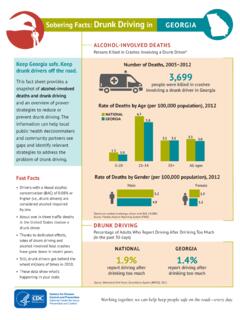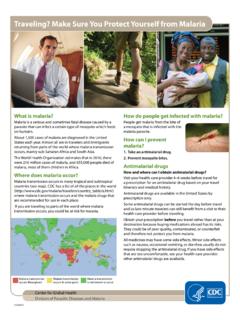Transcription of CMV Fact Sheet for Pregnant Women and Parents
1 Department of Health and Human Services Centers for Disease Control and Prevention CMV Fact Sheet for Pregnant Women and Parents Most people have been infected with cytomegalovirus (CMV), but do not have symptoms. If a Pregnant woman is infected with CMV, she can pass it to her developing baby. This is called congenital CMV, and it can cause birth defects and other health problems. For Pregnant Women You can pass CMV to your baby If you are Pregnant and have CMV, the virus in your blood can cross through your placenta and infect your developing baby. This is more likely to happen if you have a frst-time CMV infection while Pregnant but can also happen if you have a subsequent infection during pregnancy.
2 You are not likely to be tested for CMV It is not recommended that doctors routinely test Pregnant Women for CMV infection. This is because laboratory tests cannot predict which developing babies will become infected with CMV or have long-term health problems. You may be able to reduce your risk You may be able to lessen your risk of getting CMV by reducing contact with saliva and urine from babies and young children. The saliva and urine of children with CMV have high amounts of the virus. You can avoid getting a child s saliva in your mouth by, for example, not sharing food, utensils, or cups with a child.
3 Also, you should wash your hands after changing diapers. These cannot eliminate your risk of getting CMV, but may lessen the chances of getting it. For Parents About 1 out of every 200 babies is born with congenital CMV. About 1 out of 5 of these babies will have birth defects or other long-term health problems. Babies with congenital CMV may show signs at birth Some signs that a baby might have congenital CMV infection when they are born are: Small head size Seizures Rash Liver, spleen, and lung problems Tests on a baby s saliva, urine, or blood done within two to three weeks after birth can confrm if the baby has congenital CMV.
4 Early treatment may help Babies who show signs of congenital CMV at birth may be treated with medicines called antivirals. Antivirals may decrease the severity of health problems and hearing loss but should be used with caution due to side effects. Long-term health problems may occur Babies with signs of congenital CMV at birth are more likely to have long-term health problems, such as: hearing loss intellectual disability vision loss seizures lack of coordination or weakness Some babies with congenital CMV but without signs of disease at birth may still have or develop hearing loss. Hearing loss may be present at birth or may develop later in babies who passed their newborn hearing test.
5 Sometimes, hearing loss worsens with age. Hearing checks and therapies are recommended Children with congenital CMV should have regular hearing checks. Children with hearing loss should receive services such as speech or occupational therapy. These services help ensure they develop language, social, and communication skills. The earlier your child can get hearing checks and therapies, the more he or she can beneft from them. For more information, visit: National Center for Immunization and Respiratory Diseases (NCIRD) 08/02/18












